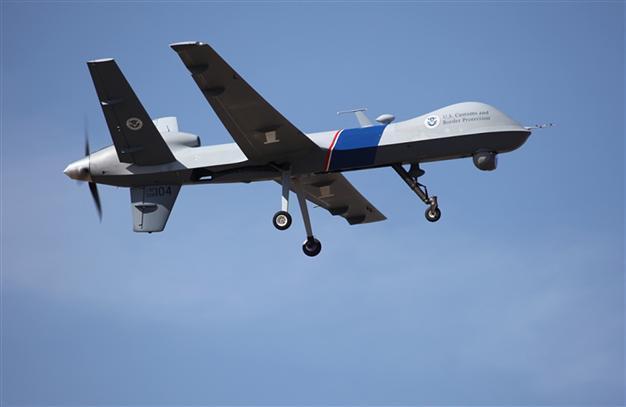Drone kills Al-Qaeda leader in Yemen
SANAA - Agence France-Presse

A wave of drone strikes since July 28 in eastern, southern and southeastern Yemen have killed more than 40 people, according to government figures. AP photo
A drone strike Friday killed an Al-Qaeda leader in Yemen, sources said, the latest in a string of attacks targeting what the US considers the extremist group's most dangerous branch.A tribal source told AFP the early morning strike on a vehicle travelling in Manasseh village in the southern province of Bayda killed Qaeed al-Dhahab and two other men.
Witnesses confirmed the death of Dhahab, a military chief of Al-Qaeda in the Arabian Peninsula, who had previously fought with the group in Iraq.
The tribal source said Dhahab was killed just hours after his marriage on Thursday.
He was the brother of Tarek al-Dhahab, an AQAP leader who in January 2012 with other militants briefly overran the town of Radah in Bayda province before being killed by Yemeni troops.
Seen as a high-profile AQAP leader, Qaeed al-Dhahab was also the brother-in-law of Yemeni-born American radical Islamic cleric Anwar al-Awlaqi, a key figure in AQAP who was killed in a drone strike in Yemen in September 2011.
A local administration official too confirmed Dhahab's death, adding his killing had provoked outrage among Al-Qaeda militants in the province.
"After news was received of his death, Al-Qaeda fighters declared the end of a truce with the authorities and began gathering" in some villages and mountainous regions, said the official, speaking on condition of anonymity.
He added that the truce, agreed with Dhahab and other AQAP leaders months ago, had ushered in a period of calm in Bayda province.
A wave of drone strikes since July 28 in eastern, southern and southeastern Yemen have killed more than 40 people, according to government figures.
They are thought to be carried by the United States, the only country in the region to have drones.
Earlier this month, Yemen said it had foiled an AQAP plot to storm a Canadian-run oil facility at Mina al-Dhaba on the Arabian Sea coast.
The United States had closed some two dozen embassies and consulates in the Middle East and North Africa since August 4 after reported intelligence intercepts from Al-Qaeda suggested an attack was imminent.
Other foreign missions in Sanaa were also closed briefly over the alleged plot, which AQAP has denied as "nonsense and propaganda".
The militants took advantage of a decline in central government control during a 2011 uprising that forced veteran president Ali Abdullah Saleh from power to seize large swathes of territory across the south, including most of Abyan province, which they controlled for a year.
They were driven out of these areas in June last year and have been increasingly weakened mainly due to US drone attacks.
They still carry out hit-and-run attacks against security forces.
Yemen is the ancestral home of Al-Qaeda founder Osama Bin Laden and the home base of the militant faction AQAP, the network's deadliest franchise according to the United States.
















